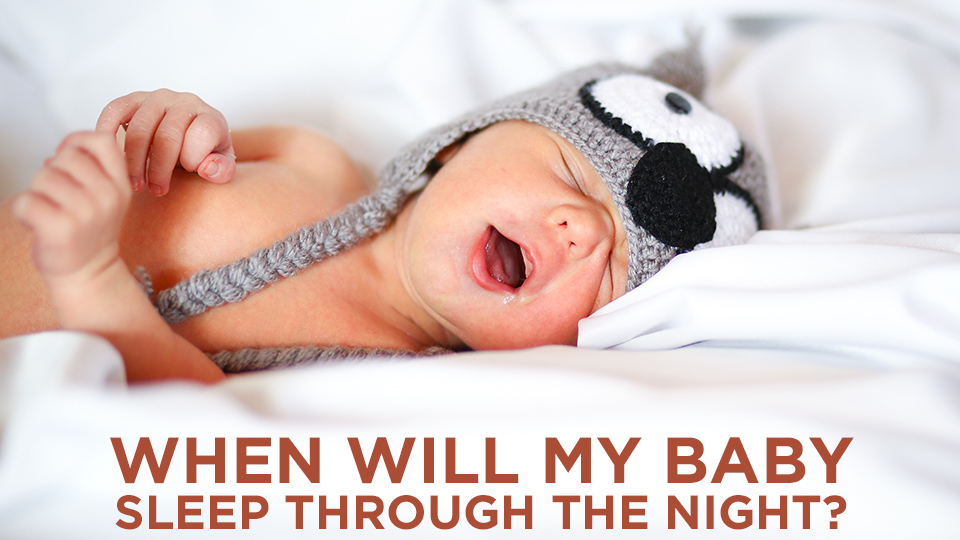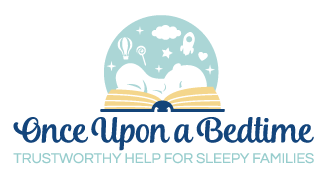
No one expects a newborn to sleep through the night. (They shouldn’t.) But is it normal for your 5-month old to still be waking three or more times every night? Does your 9-month old still need two night feedings?
Is there a “normal” age for sleeping through the night?
The short answer to this question is… there is no short answer.
Sleep is crazy complex.
It’s influenced by:
The culture a child is born into. For example, among the Kipsigis people in rural Kenya, they have one of the lowest averages for infant sleep: 11 hours at 8 months of age (compared to 14 in Switzerland). Kipsigis babies are typically cared for by older siblings.[1]Super, C. M., & Harkness, S. (2014). Complexity of Issues and Factors Influencing Sleep. In The Oxford Handbook of Infant, Child, and Adolescent Sleep and Behavior. Just imagine a 7-year old child taking care of your 14-month old toddler.
Geographic location. People tend to sleep less in urban areas.[2]Fang, S. C., Subramanian, S. V, Piccolo, R., Yang, M., Yaggi, H. K., Bliwise, D. L., & Araujo, A. B. (2015). Geographic variations in sleep duration: a multilevel analysis from the Boston Area Community Health (BACH) Survey. Journal of Epidemiology and Community Health, 69(1), 63–9.
Family dynamics. The poor youngest sibling gets woken from naps and kept up late when the family has to keep up with the schedule of the older siblings. Just how it goes.
Parenting style. For example, a 1980s study of La Leche League babies found that they breastfed more frequently and to an older age than standard care infants, and that they also experienced shorter sleep bouts and shorter total sleep per day.[3]Cable, T. A., & Rothernberger, L. A. (1984). Breast-feeding behavioural patterns among La Leche League Mothers: a descriptive survey. Journal of Pedriatrics, 73(6), 830–835.
All of these factors change how we sleep. Sleep is essentially a solitary activity in a social context. But sleep is also a biological process. The social aspect of sleep kind of overlays the biology.[4]Anders, T. F., Keener, M. A., & Kraemer, H. (1985). Sleep-wake state organization, neonatal assessment and development in premature infants during the first year of life. II. Sleep, 8(3), 193–206.[5]Jenni, O. G., & O’Connor, B. B. (2005). Children’s Sleep: An Interplay Between Culture and Biology. Pediatrics, 115(1), 204–216.
With that in mind, let’s look at what the biology of sleep looks like.
The biological timeline of sleep: Baby’s first 6 months
0-6 Weeks of Age (0-6 weeks post-due date for babies born prematurely)
- Newborns sleep an average of 15 hours in a 24-hour period, happening in short periods throughout the day and night.[6]Galland, B. C., Taylor, B. J., Elder, D. E., & Herbison, P. (2012). Normal sleep patterns in infants and children: A systematic review of observational studies. Sleep Medicine Reviews, 16(3), 213–222.
- Although 15 hours is average, there is a wide range of how long newborns sleep: anywhere from 9 to 19 hours per day.[7]Iglowstein, I., Jenni, O. G., Molinari, L., & Largo, R. H. (2003). Sleep duration from infancy to adolescence-reference values and generational trends (2003).pdf. Pediatrics, 111(2).
- Newborns spend 50% of their sleep in active sleep (similar to REM sleep that develops later).[8]Roffwarg, H. P., Muzio, J. N., & Dement, W. C. (1966). Ontogenetic Development of the Human Sleep-Dream Cycle. Science, 152(3722), 604–619.
- During active sleep, babies move around and are noisy. They can wake easily from this stage of sleep. When falling asleep, newborns start with active sleep before moving into quiet sleep.[9]Anders, T. F. (1979). Night-waking in infants during the first year of life. Pediatrics, 63(6), 860–864.
- Even in premature infants still in the hospital, sleep falls in sync with darkness when lights are regularly cycled on and off.[10]Rivkees, S. A. (2003). Developing Circadian Rhythmicity in Infants. Pediatrics, 112(2), 373 LP-381.
- Babies are born with a small amount of melatonin–the hormone associated with sleep–that has transferred from mom. This disappears by one week of age. Baby’s own production of melatonin begins around 6 weeks of age.[11]Bathory, E., & Tomopoulos, S. (2017). Sleep Regulation, Physiology and Development, Sleep Duration and Patterns, and Sleep Hygiene in Infants, Toddlers, and Preschool-Age Children. Current Problems in Pediatric and Adolescent Health Care, 1–13.
- Cortisol, the hormone that helps to keep you awake and increases appetite, begins to show higher amounts in the morning and lower amounts in the evening by one month of age.[12]Ivars, K., Nelson, N., Theodorsson, A., Theodorsson, E., Ström, J. O., & Mörelius, E. (2015). Development of Salivary Cortisol Circadian Rhythm and Reference Intervals in Full-Term Infants. PloS One, 10(6), e0129502.
- The rise and fall of melatonin and cortisol is part of baby’s developing circadian rhythm, which moves in synchrony with the presence and absence of light.
- Thanks in part to this production of melatonin and cortisol, sustained sleep of 4+ hours is now anchored at night beginning around 6 weeks of age.[13]Coons, S., & Guilleminault, C. (1984). Development of consolidated sleep and wakeful periods in relation to the day/night cycle in infancy. Developmental Medicine & Child Neurology, 26(2), 169–76.[14]Henderson, J. M. T., France, K. G., Owens, J. L., & Blampied, N. M. (2010). Sleeping through the night: the consolidation of self-regulated sleep across the first year of life. Pediatrics, 126(5), e1081-7.[15]Henderson, J. M. T., France, K. G., & Blampied, N. M. (2011). The consolidation of infants’ nocturnal sleep across the first year of life. Sleep Medicine Reviews, 15(4), 211–20.
Big picture: Newborn sleep is a round-the-clock, unpredictable party. That is, if by party you mean a fair amount of poop and crying, interspersed with snuggles and feeding and, yes, sleep. Sleep becomes a little more anchored around 6 weeks, and you’ll start to see a glimmer of hope for things falling into more of a rhythm. Aim for lots of natural daylight and minimal artificial light at night.
6 Weeks-3 Months of Age
- By 3 months, average sleep duration has decreased to about 14 hours per 24-hour period, with 75% of infants sleeping between 12 to 15 hours per day.[16]Sadeh, A., Mindell, J. A., Luedtke, K., & Wiegand, B. (2009). Sleep and sleep ecology in the first 3 years: A web-based study. Journal of Sleep Research, 18(1), 60–73.
- The influence of daylight and darkness on sleep is amazing. In the absence of artificial light, baby’s night sleep can become synchronized to sunset and sunrise by the end of the second month.[17]McGraw, K., Hoffmann, R., Harker, C., & Herman, J. H. (1999). The development of circadian rhythms in a human infant. Sleep, 22(3), 303–10. (Baby will probably still be waking once or twice at night to eat, though.)
- Between 8-11 weeks of age, sleep spindles begin to appear, marking the change from newborn to infant sleep.[18]Gomez, R. L., Newman-Smith, K. C., Breslin, J. H., & Bootzin, R. R. (2011). Learning, Memory, and Sleep in Children. Sleep Medicine Clinics, 6(1), 45–57. These sleep spindles are super cool. They’re bursts of brain activity, that transfer memories out of the short-term holding place (the hippocampus) to more long-term memory storage (the cortex). This enables memories to become more permanent, as well as clears room for new learning to occur.[19]Walker, M. P. (2017).
- The biggest increase in uninterrupted sleep happens by the age of 3 months.[20]Henderson, J. M. T., France, K. G., & Blampied, N. M. (2011). The consolidation of infants’ nocturnal sleep across the first year of life. Sleep Medicine Reviews, 15(4), 211–20. By 4 months of age, about 70% of babies were sleeping quietly from midnight to 5am in this New Zealand sample.
Big picture: There’s a lot going on internally between 2-3 months that allows your baby’s sleep to lengthen at night. While there are certainly a few things you can do at this age to help get your baby’s sleep off to a good start, most of what’s happening is just biology. Baby isn’t going to sleep longer because you’re following a particular method or because you decided to add cereal to his bottle (please don’t).
4-6 Months of Age
- Total sleep per 24-hour period doesn’t change much from this 4-6 month age until about 24 months of age. Babies at 4-6 months are sleeping about 9-12 hours at night and 3-5 hours during the day.[21]Sadeh, A., Mindell, J. A., Luedtke, K., & Wiegand, B. (2009). Sleep and sleep ecology in the first 3 years: A web-based study. Journal of Sleep Research, 18(1), 60–73.
- Several big changes happen around 4 months of age. Babies are more likely to fall asleep starting with NREM (non rapid eye movement) sleep instead of through active sleep, and they begin to experience deep slow wave sleep.[22]Grigg-Damberger, M., Gozal, D., Marcus, C. L., Quan, S. F., Rosen, C. L., Chervin, R. D., … Iber, C. (2007). The visual scoring of sleep and arousal in infants and children. Journal of Clinical Sleep Medicine : JCSM : Official Publication of the American Academy of Sleep Medicine, 3(MARCH 2007), 201–240.
- As a result of this maturing of baby’s sleep, distinct sleep cycles are now happening through the night. These cycles end with a brief “checking” wake-up happening at the end of each.[23]Flynn-Evans, E., & Casano, M. (2016). Baby Sleep Science Guide: Overcoming The Four-Month Sleep Regression (Volume 1). CreateSpace Independent Publishing Platform. Babies wake up briefly 2 to 6 times every night as part of the nature of these sleep cycles.[24]Mindell, J. A., & Owens, J. A. (2015). A clinical guide to pediatric sleep : diagnosis and management of sleep problems (3rd ed.).
- 4 month olds now have REM sleep instead of active sleep. During REM sleep, we become mostly paralyzed, as a way of preventing us from acting out our dreams.[25]Kohyama, J., Tachibana, N., & Taniguchi, M. (1999). Development of REM sleep atonia. Acta Neurologica Scandinavica, 99(6), 368–73. Your baby can still wake easily out of REM sleep, but this part of sleep will be less noisy than as a newborn.
- By 6 months of age, a pretty stable pattern appears among infants. Two-thirds mostly sleep quietly all night long, while about a third of all infants continue to wake multiple times every night.[26]Weinraub, M., Bender, R. H., Friedman, S. L., Susman, E. J., Knoke, B., Bradley, R., … Williams, J. (2012). Patterns of developmental change in infants’ nighttime sleep awakenings from 6 through 36 months of age. Developmental Psychology, 48(6), 1511-1528.
- Babies still wake at night between 6-12 months,[27]MOORE, T., & UCKO, L. E. (1957). Night waking in early infancy. I. Archives of Disease in Childhood, 32(164), 333–42., but these wakings are related to aspects of development (pulling to stand, crawling, separation anxiety) rather than hunger-driven as in newborns.[28]Mindell, J. A., & Owens, J. A. (2015). A clinical guide to pediatric sleep : diagnosis and management of sleep problems (3rd ed.).
- It is at 6 months of age that continued night waking is considered to be a behavioral issue. Experts define this as, “behavioral insomnia of childhood.”[29]Tikotzky, L., Sadeh, A., Meesters, C., Muris, P., Ollendick, T. H., Lichstein, K. L., & Al., E. (2010). The role of cognitive-behavioral therapy in behavioral childhood insomnia. Sleep Medicine, 11(7), 686–91.
Big picture: By 6 months, a healthy baby is biologically capable of sleeping for longer stretches at night; most for a full 10-12 hour night. When healthy sleep habits are established early on, none of this is forced on baby: a full night of sleep just naturally unfolds.
You may be interested in reading the posts on Magic Sleep Dust: Bedtime Routines and Trusting for a Good Night’s Sleep to get you started. Looking for some one-on-one guidance? Contact me for a customized sleep plan to get your family on the path to healthy sleep!
Sweet dreams!
Interested in the research? If you’re the scholarly sort, you may enjoy:
Clinical Management of Behavioral Insomnia of Childhood
Infant Sleep Problems: Origin, Assessment, Interventions
I'm ready for a good night's sleep
References
